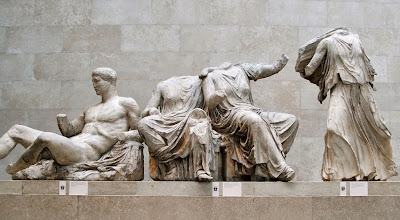UNESCO Letter to
British Government
for return of Parthenon Sculptures

Innanzitutto è giusto descrivere esattamente quale sia l’oggetto del contendere: si tratta di 15 metope, 56 bassorilievi di marmo e 12 statue, quasi l’intero frontone ovest del Partenone, in cui era rappresentata la processione panatenaica, oltre ad una delle sei Cariatidi del tempietto dell’Eretteo. Il Partenone, eretto tra il 447 ed il 432 a.C per volere di Pericle il grande, dopo numerose “trasformazioni” dovute alle diverse occupazioni, subisce il danno più grave nel 1687, quando il generale veneziano Francesco Morosini bombarda l’Acropoli sapendo che i turchi la utilizzano come deposito di polvere da sparo; una tremenda esplosione distrugge una rilevante parte del monumento.
Nel 1804 Lord Elgin, ambasciatore britannico presso l’impero Ottomano, asporta quanto sopra descritto. Da allora i marmi greci custoditi al British Museum sono conosciuti come 'Elgin's Marbles'. Anche se il diritto morale di appartenenza dà ragione alle istanze greche, la questione legale internazionale è molto più complicata e spesso avversa alle ragioni del cuore e della logica.
Nel 1804 Lord Elgin, ambasciatore britannico presso l’impero Ottomano, asporta quanto sopra descritto. Da allora i marmi greci custoditi al British Museum sono conosciuti come 'Elgin's Marbles'. Anche se il diritto morale di appartenenza dà ragione alle istanze greche, la questione legale internazionale è molto più complicata e spesso avversa alle ragioni del cuore e della logica.
In a pivotal moment for the reinforcement of efforts for the return of the Parthenon Sculptures, an international deliberation of the individual committees is held on Sunday, Oct. 6 in Athens.
UNESCO has sent a letter to the British Foreign Secretary, informing him of Greece’s request for the return of the Parthenon Marbles.
During the meeting of Minister of Culture & Sports Mr. Panos Panagiotopoulos with the General Director of UNESCO in Paris in July, Mrs. Irina Bokova was asked to influence from personal and institutional position, in order to initiate the mediation process with the British side.
UNESCO, as international cultural organization, wrote a letter to the British Foreign Minister William Chag , the British Minister for Culture Ms Maria Miller and the Director of the British Museum Mr. Robert Neil McGregor.
In this letter the British officials were informed officially about the request of the Greek side to proceed to the process of mediation in order to reach a settlement on the issue of Parthenon Sculptures.
If the British side agree to conduct this process, it will be the first time that UNESCO will enable this institution to resolve cultural differences between two countries.
The issue of the Parthenon Sculptures has, since 1987, steadily been in the agenda of any conference of the UNESCO Intergovernmental Committee for Promoting the Return of Cultural Property to its Countries of Origin or repatriation in case of illegal possessions.
Under these conditions , the International committee meetings to be held next Sunday at the Acropolis Museum acquires major importance .
Source: IEMC-UNESCO [October 03, 2013]
 |
| If the British side agrees to participate this process, it will be the first time that UNESCO will have taken action to solve a cultural dispute between two European member states [Credit: TANN] |
During the meeting of Minister of Culture & Sports Mr. Panos Panagiotopoulos with the General Director of UNESCO in Paris in July, Mrs. Irina Bokova was asked to influence from personal and institutional position, in order to initiate the mediation process with the British side.
UNESCO, as international cultural organization, wrote a letter to the British Foreign Minister William Chag , the British Minister for Culture Ms Maria Miller and the Director of the British Museum Mr. Robert Neil McGregor.
In this letter the British officials were informed officially about the request of the Greek side to proceed to the process of mediation in order to reach a settlement on the issue of Parthenon Sculptures.
If the British side agree to conduct this process, it will be the first time that UNESCO will enable this institution to resolve cultural differences between two countries.
The issue of the Parthenon Sculptures has, since 1987, steadily been in the agenda of any conference of the UNESCO Intergovernmental Committee for Promoting the Return of Cultural Property to its Countries of Origin or repatriation in case of illegal possessions.
Under these conditions , the International committee meetings to be held next Sunday at the Acropolis Museum acquires major importance .
Source: IEMC-UNESCO [October 03, 2013]



